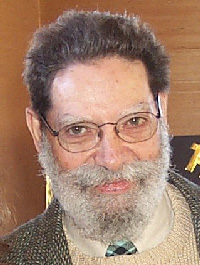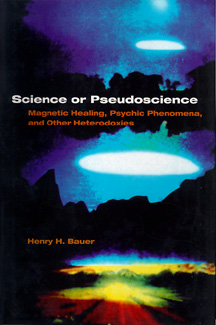How Much We Don't Yet Know!
Science or Pseudoscience

http://www.destinationspace.net
A Review of Dr. Henry Bauer's Science or Pseudoscience: Magnetic Healing, Psychic Phenomena, and Other Heterodoxies, University of Illinois Press, 2001
Long before I was allowed to write my doctoral thesis, my doctoral committee chairman, Dr. Stanley Krippner, insisted that I read Thomas S. Kuhn's The Structure of Scientific Revolutions (written in 1962), which the journal, Science, referred to as a landmark in intellectual history. Thomas Kuhn was an historian, a philosopher of science, and he gave an analysis of how systems change or don't. The Structure of Scientific Revolutions literally rocked the intellectual world.
Denise Breton and Christopher Largent described Kuhn's impact in their 1996 book, The Paradigm Conspiracy (pg. 5):
To raise paradigm issues is to reflect on the ideas or concepts were using as our map of reality -- our world view, life perspective, philosophy, or mental model. Whatever we call it, it's powerful stuff. To look at our paradigm is to look at the blueprint were using to build our worlds.
In the popular press in the 1980s, and in particular after Marilyn Ferguson's The Aquarian Conspiracy the term paradigm shift became almost a mantra. Many concluded at that time, that we were in the process of a shift in our thought paradigm.
Concerning such a shift, Breton and Largent stated (pg. 7):
Paradigm shifts: The revolutionary development comes when the paradigm reaches a crisis. It doesn't solve problems the way it once did. Anomalies -- things that the paradigm can't explain -- start accumulating. Paradigm health starts making us sick. More and more, the paradigm doesn't work. That's when scientists are challenged to shift paradigms by moving into a phase Kuhn calls extraordinary science.
But extraordinary science isn't easy. In language suited to academia, Kuhn describes how scientists essentially freak out. Everything they ever learned is called into question.
The more the paradigm fails to do its job, the more old-paradigm scientists try to make it work. The paradigm is ripe for a revolution, but because they've forgotten that they even have a paradigm, scientists conclude instead that their world is falling apart. Solutions -- alternative ways of doing science -- don't exist. As far a they're concerned, they've explored all the possibilities, and the only options they see don't help. Theyíre too paradigm-bound to notice that they're stumbling over the limits of their own models.
I believe this is being born out in scores of areas of research dealing with alternatives in healing, geology, extraterrestrial life and non-polluting energies, to name a few. It's true that 20th Century paradigms of all areas of knowledge are undergoing significant discoveries and perhaps some fundamental changes.
To keep up with these fundamental changes, we suggest you subscribe to the Journal of Scientific Exploration which is a quarterly peer-reviewed journal costing just $65.00 per year. But to really grasp what is going on with Big Science and why there is such resistance to new ideas, you need a copy of Dr. Henry Bauer's Science or Pseudoscience: Magnetic Healing, Psychic Phenomena and Other Heterodoxies published this year by the University of Illinois Press. Henry H. Bauer, Dean Emeritus of Arts & Sciences, Professor Emeritus of Chemistry and Science Studies Virginia Polytechnic Institute and State University, is the Editor-in-Chief of the Journal of Scientific Exploration, and the author of several other books like The Enigma of Loch Ness: Making Sense of a Mystery and Scientific Literacy and the Myth of the Scientific Method, which we recommend to our listener and guests almost monthly.
Dr. Bauer told us he wrote this book to examine what can be done about subjects that science doesn't investigate. Dismissing a subject as pseudo-science implies that only Science can achieve valid knowledge so that all subjects it does not investigate are spurious. The tale of how he came to write this book is illuminating in itself. Dr. Bauer says, Four decades ago I became fascinated by the possible existence of Loch Ness Monsters. Three decades ago I became convinced they really exist. Then I wondered, why doesn't science look into such exciting possibilities? That led me to learn something about the history and philosophy of science, and about many scientific unorthodoxies, and I recognized quite a number of generalizations that hadn't been written up in any systematic way. So I came to teach science-and-humanities courses, and wrote books about Loch Ness Monsters, Immanuel Velikovsky, and scientific literacy and the scientific method. This latest book was the hardest to write. I started it in 1985 and had quite a long draft, and had got encouraging comments from several people, but somehow I didn't feel ready to finish it. Then a couple of years ago, I realized that if I didn't do it soon, I probably never would. While I was writing it, I started completely afresh several times before realizing what I really wanted to say. I'm still not completely satisfied with it, especially as to presentation and ease for readers, but at least Iíve put down the main points I wanted to get across.
Some of our favorite subjects that have been dismissed as pseudo science are reexamined as scientific with this perspective, and Bauer relates the search for the giant squid, the

Bauer is a humorous writer and acknowledges that his critics will probably not be able to keep from being nasty. He recommends that if the skeptics insist on being nasty, they should at least distinguish genuine knowledge-seekers from self-promoting confidence tricksters. As he points out, many cryptozoologists, parapsychologists, and ufologists are perfectly honest, genuine seekers of understanding (while some mainstream researchers are not very honest).
For an unusually unbiased, yet scientific, approach to some of the subjects that are borderland respectable sometimes called pseudo-science, sometimes admitted into science, but generally still controversial (how much don't we yet know about electromagnetism and living processes! About archaeoastronomy!) you must read this book. (Click here to do so)
http://www.henryhbauer.homestead.com
http://www.scientificexploration.org
Hieronimus & Co., Inc., P.O.
Box 648, Owings Mills, MD 21117 USA
Voice Mail: (410) 356-4852 Fax: (410) 356-6229
Voice Mail: (410) 356-4852 Fax: (410) 356-6229